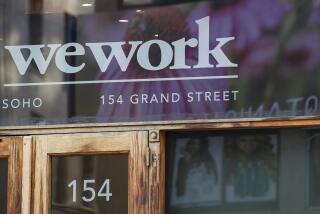Zynga under pressure as low share price provokes lawsuit
When it rains, it pours.
Zynga’s shares hit a new low Tuesday after news of a lawsuit filed Monday by shareholder Mark DeStefano began to circulate. Such suits are common after a company’s stock price nosedives, as Zynga’s did last Wednesday following a bleak second-quarter earnings report.
The following day, the San Francisco game company’s shares dropped 37% to $3.18, down from $5.08 the day before. Zynga closed at an all-time low of $2.96, down 6 cents, Tuesday.
That compares with Zynga’s $10 per share initial public offering price when the stock debuted on the stock market in December, and a high of $14.69 on March 2.
While revenue grew 19% from a year earlier to $332.5 million in the quarter, Zynga swung to a loss of $22.8 million compared with a profit of $1.4 million a year earlier. In addition, the amount of revenue Zynga generated on average from each daily player fell 10% to 4.6 cents, down from 5.1 cents a year earlier.
Zynga also lowered its revenue forecast, estimating sales of $1.15 billion to $1.225 billion for the year. Company officials blamed recent changes in the way Facebook promotes games, which de-emphasized existing titles in favor of newly launched games. Zynga, which operates seven of the top 10 games on Facebook, saw traffic for its older games drop off.
Last week the game company outlined several initiatives to wean itself away from Facebook and bring its games to other platforms, including mobile devices as well as its own website, Zynga.com.
As part of that strategic shift, Zynga Chief Executive Mark Pincus is taking a larger role in developing cross-platform games. As a result, David Ko, head of Zynga Mobile, and Steve Chiang, executive vice president of games, will report directly to Pincus instead of John Schappert, the company’s chief operating officer. Schappert will continue to run Zynga’s day-to-day operations.
The lawsuit, filed in San Francisco federal court, alleged top Zynga executives knew the company was in trouble when they cashed out $516 million in April on a secondary stock offering. Among them was Pincus, Zynga’s founder, who sold 16.5 million shares at $12 a share for a total of $200 million.
Henry Blodget, a former Wall Street technology analyst and now a finance blogger, noted the insider trades last week in a post, observing that “Zynga insiders cashed out at exactly the right time.”
Blodget concluded, however, that “the last thing they would intentionally do is unload stock when they thought it was about to crash -- especially when the amount they made in the sale, though huge, is still relative chicken-feed for them. Also, all of these folks only sold a fraction of their holdings, so they’ve been hammered along with the rest of Zynga shareholders by the subsequent collapse.”
RELATED:
Zynga shares fall 41% on earnings
Zynga Chief Operating Officer plays it safe
Facebook’s social gaming ecosystem looks shaky
Twitter: @AlexPham
More to Read
From the Oscars to the Emmys.
Get the Envelope newsletter for exclusive awards season coverage, behind-the-scenes stories from the Envelope podcast and columnist Glenn Whipp’s must-read analysis.
You may occasionally receive promotional content from the Los Angeles Times.







